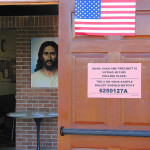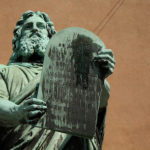We run our website the way we wished the whole internet worked: we provide high quality original content with no ads. We are funded solely by your direct support. Please consider supporting this project.

Should Christians Recite the Pledge of Allegiance?
A number of years ago I attended a basketball game at a Christian school. Just before the game everyone was asked to stand and say the Pledge of Allegiance. So I stood, placed my hand over my heart, and began to recite our national creed. Halfway through, however, I began to wonder what I was doing. I’m called to live as a foreigner in a strange land. I’m called to be a citizen of the Kingdom that is not of this world. I’m called to live as a soldier stationed in enemy occupied territory who has the job of carrying out the will of my enlisting officer. Yet here I was pledging allegiance not to Christ, but to the flag of a foreign land in which I happened to be stationed.
Early Christians were willing to be martyred rather than express allegiance to the Roman Empire, but here I was expressing allegiance to the American empire. This didn’t seem right. I stopped and haven’t said the Pledge since. I love America, but I cannot serve two masters. My allegiance must be pledged to Christ alone.
I acknowledge that people have different opinions about this matter. Some have told me they recite the Pledge to express support for the good things America stands for, not to express their ultimate allegiance to it. Others have told me they do it out of respect for those who have sacrificed their lives to defend our rights and freedoms, but again, not to pledge their ultimate allegiance. Others have told me they do it simply because they feel like a communist if they don’t. Fine. My concern isn’t with this particular American ritual.
What concerns me is that it doesn’t even occur to many American Christians that there might be a conflict between their allegiance to Christ and their Pledge of Allegiance to America. Their faith has become so nationalized that they assume these dual allegiances are compatible. This is an idolatrous assumption, and it helps explain why the lives of most American Christians are indistinguishable from the lives of their pagan American neighbors. We’re failing to revolt against the pagan values of our nation because the nation with its pagan values, has our allegiance—to the point that many followers of Jesus don’t even recognize the pagan values as pagan. They rather think the nation, with its values, is basically “Christian”!
It’s time for Kingdom people in America to be done with this. Our ultimate allegiance cannot be to America or any other country. It cannot be to a flag, democracy, the right to defend ourselves, the right to do what we want, the right to vote, or the right to pursue happiness however we see fit. We are Kingdom people only to the extent that God alone is King of our lives, and thus only to the extent that we revolt against the temptation to make any cultural values or ideas supreme.
—Adapted from Myth of a Christian Religion, pages 87-88.
Image by TheeErin via Flickr
Category: Q&A
Tags: America, Myth of a Christian Nation, Myth of a Christian Religion, Nationalism, Politics
Topics: Ethical, Cultural and Political Issues
Related Reading

Christians and Politics: What are the different views?
How involved should Christians be in secular politics? Throughout history, Christians have embraced a number of different perspectives on this issue. These perspectives can basically be broken down into three groups. First, some Christians believe that one of the church’s jobs is to transform and ultimately control politics. This view has often been labeled the…

Conservative/Liberal are not Theological Categories
We wanted to repost something by Jonathan Martin today that struck a chord with us about the theological emptiness of political boxes. It’s brief and beautifully written and we hope you’ll read the entire article here. For those of you who are weary of the political tug-of-war for your soul, here’s some hope: And so…

Reinterpreting the Law, Violence and Nationalism of the OT
The law of the OT was intended to serve a negative object lesson. This finds its clearest expression in Paul. To begin, Paul interpreted Jesus’ death on the cross largely in sacrificial and substitutionary terms. On the cross, Paul believed, Jesus suffered the full curse of the law on our behalf. Because of this saving…

Trapped in a Constantinian Paradigm
A Response to James Smith’s Review of The Myth of a Christian Nation In my book The Myth of a Christian Nation I repeatedly call on Christians to engage in social activism. Followers of Jesus are called to be revolutionaries, I argue, meaning that we are to revolt against the status quo insofar as the…

Two Kingdoms
The kingdom of God is holy—meaning “separate, set apart, consecrated.” It looks like Jesus, nothing else. We can’t simply equate the kingdom with everything we think is good, noble, and true. Nor can we align the kingdom with any nation, government, or political ideology. The kingdom Jesus embodied and established is one of a kind.…

The Political Ambiguity of Caring for the Poor
Ronn aka “Blue” Aldaman via Compfight In case you think the last post was a veiled endorsement for Obama, here’s an article arguing that Mitt Romney is the candidate to vote for if you really care for the poor. Again, there are many schools of thought and it’s overly simplistic to think that voting for…
